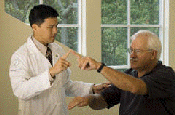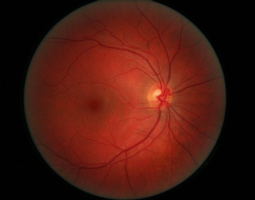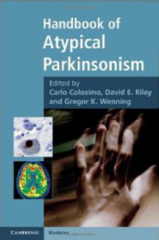28th May 2011 - News release
NLX-P101 CLINICAL TRIAL DATA FOR PARKINSON'S
DISEASE
Neurologix have provided details of a Phase 2 clinical trial of NLX-P101 in
Parkinson's Disease. NLX-P101 is a gene therapy under investigation for the
treatment of Parkinson's Disease. NLX-P101 increases the level of GABA,
 a
substance involved in muscular movement that is naturally produced in the brain.
In a one-year follow-up, patients treated with NLX-P101 who achieved
clinically-meaningful symptom improvements increased from 50% at six months to
63% after one year. No serious adverse events related to the therapy or surgery were reported.
a
substance involved in muscular movement that is naturally produced in the brain.
In a one-year follow-up, patients treated with NLX-P101 who achieved
clinically-meaningful symptom improvements increased from 50% at six months to
63% after one year. No serious adverse events related to the therapy or surgery were reported.
NLX-P101 led to an average improvement of 23% in those people treated, which is
an 8 point reduction from their symptom questionnaire score. Those patients
undergoing sham surgery (those that were untreated) had an average improvement
of nearly 13%, which is nearly a 5 point reduction from their symptom
questionnaire score. Therefore the average improvement beyond that of
doing nothing was only actually 10% and occurred in only just over half of
patients. For more information go to the
News release. In order to refer to this
article on its own
click here.
25th May 2011 - News release
PROSAVIN CLINICAL TRIAL DATA FOR PARKINSON'S
DISEASE
Oxford BioMedica, a leading gene therapy company, have announced clinical data
from a Phase I/II clinical trial of ProSavin for the treatment of Parkinson�s
Disease. They claim : an average improvement in motor
function of 43%, a maximum improvement of 61%, an increase in "on" time of 3
hours, and an decrease in "off"
 time
of 4 hours. Two doses have been tested. For more information go to the
News release.
ProSavin uses Oxford BioMedica's own
LentiVector gene delivery technology to deliver
the genes for three enzymes that are required for the formation of dopamine. The
product is administered locally to the relevant region of the brain in order to
increase the brain's own capacity for the formation of dopamine. For more
information go to
ProSavin.
time
of 4 hours. Two doses have been tested. For more information go to the
News release.
ProSavin uses Oxford BioMedica's own
LentiVector gene delivery technology to deliver
the genes for three enzymes that are required for the formation of dopamine. The
product is administered locally to the relevant region of the brain in order to
increase the brain's own capacity for the formation of dopamine. For more
information go to
ProSavin.
However, only nine patients have
so far been tested, and only for part of the intended duration of the clinical
trial. The claim of increased "on" time and decreased "off" time has come only
from two patients, and had been entirely self reported by the patients
themselves. The claim of
an average improvement in motor function of 43%, and a maximum improvement of
61% comes from only three of the patients who have been tested for the least
time. It was not the actual average improvement of the patients, which was much
less. Those patients tested for the longest actually declined in their
improvement as time wore on. In order to refer to this article on its own
click here.
23rd May 2011 - New review
MISDIAGNOSIS IN PARKINSON'S DISEASE
Misdiagnosis in Parkinson's Disease is very common. Initial diagnoses of
Parkinson's Disease made by general neurologists were only infrequently changed
[reference
1],
yet were incorrect in 24% to 35% of cases
[reference
1]
[reference
2].
This means that many people have been treated for Parkinson's Disease for the
rest of their lives without ever having had Parkinson's Disease. In people
taking Parkinson's Disease drugs, Parkinsonism was confirmed in only 74% of
cases and only 53% of them had probable Parkinson's Disease. Over a quarter of
the
 patients
did not benefit from Parkinson's Disease drugs
[reference
2]
[reference 3]. More than 1 in 3 people with tremor were misdiagnosed
as having Essential Tremor, when the majority of them actually had Parkinson's
Disease
[reference 4]. As many as a quarter of people
with tremor disorders were wrongly diagnosed as having tremor dominant
Parkinson's disease, and as many as a fifth of people with tremor dominant
Parkinson's disease were wrongly diagnosed as having other tremor disorders
[reference 5]. In order to refer to this article on its own
click here.
patients
did not benefit from Parkinson's Disease drugs
[reference
2]
[reference 3]. More than 1 in 3 people with tremor were misdiagnosed
as having Essential Tremor, when the majority of them actually had Parkinson's
Disease
[reference 4]. As many as a quarter of people
with tremor disorders were wrongly diagnosed as having tremor dominant
Parkinson's disease, and as many as a fifth of people with tremor dominant
Parkinson's disease were wrongly diagnosed as having other tremor disorders
[reference 5]. In order to refer to this article on its own
click here.
15th May 2011 - New research
RETINAL STEM CELLS FAIL TO RID PARKINSON'S
DISEASE
Lancet Neurology [2011] May 10 [Epub ahead of print] (Gross RE, Watts RL, Hauser
RA, Bakay RA, Reichmann H, von Kummer R, Ondo WG, Reissig E, Eisner W,
Steiner-Schulze H, Siedentop H, Fichte K, Hong W, Cornfeldt M, Beebe K,
Sandbrink R)
Complete abstract
Human retinal pigment epithelial (RPE) cells in the eyes also produce L-dopa. So
their transplantation into the brain of people with Parkinson's Disease was
considered to be able to improve the continuity of the administration of L-dopa
better than the use of oral L-dopa. Researchers aimed to assess the safety,
tolerability, and efficacy of transplantation of human retinal pigment
epithelial cells into people with advanced Parkinson's Disease. Around 650,000
cells were injected in to the brain of each patient. Each person's
symptoms were then assessed after a year.
 However,
it was found that the treatment made no difference at all concerning their
Parkinson's Disease symptoms. The method also caused adverse events, most of
which were neurological or psychiatric. The authors of the research concluded
that transplantation of human retinal pigment epithelial cells provided no
benefit for Parkinson's Disease. A previous study found that the transplanted
retinal cells failed to survive. For more information go to
Retinal stem cells disappear after surgery.
In order to refer to this article on its own
click here.
However,
it was found that the treatment made no difference at all concerning their
Parkinson's Disease symptoms. The method also caused adverse events, most of
which were neurological or psychiatric. The authors of the research concluded
that transplantation of human retinal pigment epithelial cells provided no
benefit for Parkinson's Disease. A previous study found that the transplanted
retinal cells failed to survive. For more information go to
Retinal stem cells disappear after surgery.
In order to refer to this article on its own
click here.
12th May 2011 - New research
DID GENERAL MACARTHUR HAVE PARKINSON'S DISEASE ?
Neurology
[2011] 76 (19) : 1668-1672 (Bowen LN, Malaty IA, Rodriguez RL, Okun MS.)
Complete abstract
Historians have often claimed that General MacArthur had Parkinson Disease, and
that his illness may have influenced his military judgment. General MacArthur
(1880-1964) was Chief of Staff of the U.S. Army and played a prominent role as a
Field Marshall in World War 2. For more information go to
General MacArthur. It is already well established that Hitler had
Parkinson's Disease throughout World War 2, and that he was preoccupied with it
in the last days of World War 2. For more information go to
Adolf Hitler and Parkinson's Disease.
 Researchers
reviewed the literature, medical studies, images and videos concerning General
MacArthur as well as his personal writings to determine the likelihood that he
had Parkinson's Disease.
They examined his facial profiles, facial expression, gait, posture, and
movement. Handwriting samples were compared for evidence of micrographia. Videos
and handwriting samples were independently reviewed by neurologists. Video
footage showed evidence of progression of head tremors, postural action tremors,
and also voice tremors. However, there were no indications of a masked face,
rigidity, bradykinesia, or resting tremor on film footage. There was no evidence
of micrographia in handwriting samples either. Oral testimony and letters
written by an attending gastroenterologist present at MacArthur's death in 1964
revealed no evidence of parkinsonian features. The researchers therefore
concluded that General MacArthur had essential tremor that became worse, but that it did not progress to Parkinson's Disease. In order to
refer to this article on its own
click here.
Researchers
reviewed the literature, medical studies, images and videos concerning General
MacArthur as well as his personal writings to determine the likelihood that he
had Parkinson's Disease.
They examined his facial profiles, facial expression, gait, posture, and
movement. Handwriting samples were compared for evidence of micrographia. Videos
and handwriting samples were independently reviewed by neurologists. Video
footage showed evidence of progression of head tremors, postural action tremors,
and also voice tremors. However, there were no indications of a masked face,
rigidity, bradykinesia, or resting tremor on film footage. There was no evidence
of micrographia in handwriting samples either. Oral testimony and letters
written by an attending gastroenterologist present at MacArthur's death in 1964
revealed no evidence of parkinsonian features. The researchers therefore
concluded that General MacArthur had essential tremor that became worse, but that it did not progress to Parkinson's Disease. In order to
refer to this article on its own
click here.
7th May 2011 - New research
DAYTIME SLEEPINESS TRIPLES THE RISK OF
PARKINSON'S DISEASE
Sleep Medicine Reviews [2011] 15 (1) : 41-50 (S.Zoccolella, M.Savarese,
P.Lamberti, R.Manni, C.Pacchetti, G. Logroscino)
Complete abstract
 Recent
studies showed that sleep disorders may precede the onset of Parkinson's
Disease. Excessive daytime sleepiness has been found to be associated with three
times the risk of developing Parkinson's Disease. Available information suggests
that sleep disorders may actually be the heralding clinical manifestation for
Parkinson's Disease onset. Sleep disorders are one of the most frequent
manifestations of Parkinson's Disease once it has developed. Incidence
of sleep disorders during Parkinson's Disease progressively
increase with the duration of Parkinson's Disease. Factors most related
with an increase in sleep disorders in Parkinson's Disease are : older age, male
gender, higher dosages of dopaminergic drugs, cognitive impairment and
hallucinations.
Recent
studies showed that sleep disorders may precede the onset of Parkinson's
Disease. Excessive daytime sleepiness has been found to be associated with three
times the risk of developing Parkinson's Disease. Available information suggests
that sleep disorders may actually be the heralding clinical manifestation for
Parkinson's Disease onset. Sleep disorders are one of the most frequent
manifestations of Parkinson's Disease once it has developed. Incidence
of sleep disorders during Parkinson's Disease progressively
increase with the duration of Parkinson's Disease. Factors most related
with an increase in sleep disorders in Parkinson's Disease are : older age, male
gender, higher dosages of dopaminergic drugs, cognitive impairment and
hallucinations.
The
researchers do not explain why excessive daytime sleepiness could lead to such
an increased risk of Parkinson's Disease. However, it is known that melatonin,
which is produced during sleep affects dopamine, the substance whose deficiency
causes Parkinson's Disease. In order to refer to this article on its own
click here.
5th May 2011 - New research
PARDOPRUNOX - A NEW DOPAMINE AGONIST FOR
PARKINSON'S DISEASE
Movement Disorders [2011] May 3 [Epub ahead of print] (C.Sampaio, J.Bronzova,
R.A.Hauser, A.E.Lang, O. Rascol, S.V.van de Witte, A.A.Theeuwes)
Complete abstract
This study presents
the results of two clinical trials concerning the efficacy and safety of
Pardoprunox in people with early Parkinson's disease. Pardoprunox is a partial
dopamine agonist that is presently being assessed. It unusually combines two
effects as if it were two distinct but combined drugs : partially stimulating
dopamine, whose deficiency causes Parkinson's Disease, and fully stimulating
serotonin. It was thought that Pardoprunox could avoid some of the severe side
effects dopamine agonists cause by lessening the effect of dopamine when
dopamine activity is high.
 Pardoprunox
showed a significant benefit in reducing Parkinson's Disease symptoms. In one
study 6mg was better than 12mg or 12mg-42mg. However, in another study,
Pardoprunox was not quite as effective as the dopamine agonist pramipexole
(Mirapex). Pardoprunox tolerability was dose related. The higher dosages showed
the highest drop out rate due to adverse events, which occurred in about half of
patients. The main problems caused were nausea, somnolence, and dizziness.
Observations suggest that the 12mg-42mg per day dose range was higher than
therapeutically required. In order to refer to this article on its own
click here.
Pardoprunox
showed a significant benefit in reducing Parkinson's Disease symptoms. In one
study 6mg was better than 12mg or 12mg-42mg. However, in another study,
Pardoprunox was not quite as effective as the dopamine agonist pramipexole
(Mirapex). Pardoprunox tolerability was dose related. The higher dosages showed
the highest drop out rate due to adverse events, which occurred in about half of
patients. The main problems caused were nausea, somnolence, and dizziness.
Observations suggest that the 12mg-42mg per day dose range was higher than
therapeutically required. In order to refer to this article on its own
click here.
4th May 2011 - New book
HANDBOOK OF ATYPICAL PARKINSONISM
Carlo Colosimo (Editor), David E.Riley
(Editor), Gregor K.Wenning (Editor)
 Publisher's description : Neurologists are increasingly faced with atypical
parkinsonian disorders, which mimic Parkinson's disease but can be difficult to
diagnose. Improved diagnostic sophistication is increasingly enabling
neurologists to differentiate between Parkinson's disease and atypical
parkinsonism. The Handbook of Atypical Parkinsonism is a comprehensive survey of
all diseases of this category, providing an authoritative guide to the
recognition, diagnosis and management of these disorders. Written and edited by
leading practitioners in the field, clinicians in neurology and other
specialties will find this book essential to the understanding and diagnosis of
this complex group of disorders.
Click here for more details.
For
more books concerning Parkinson's Disease go to
Parkinson's Disease Books.
Publisher's description : Neurologists are increasingly faced with atypical
parkinsonian disorders, which mimic Parkinson's disease but can be difficult to
diagnose. Improved diagnostic sophistication is increasingly enabling
neurologists to differentiate between Parkinson's disease and atypical
parkinsonism. The Handbook of Atypical Parkinsonism is a comprehensive survey of
all diseases of this category, providing an authoritative guide to the
recognition, diagnosis and management of these disorders. Written and edited by
leading practitioners in the field, clinicians in neurology and other
specialties will find this book essential to the understanding and diagnosis of
this complex group of disorders.
Click here for more details.
For
more books concerning Parkinson's Disease go to
Parkinson's Disease Books.
.gif)
.gif)
 a
substance involved in muscular movement that is naturally produced in the brain.
In a one-year follow-up, patients treated with NLX-P101 who achieved
clinically-meaningful symptom improvements increased from 50% at six months to
63% after one year. No serious adverse events related to the therapy or surgery were reported.
a
substance involved in muscular movement that is naturally produced in the brain.
In a one-year follow-up, patients treated with NLX-P101 who achieved
clinically-meaningful symptom improvements increased from 50% at six months to
63% after one year. No serious adverse events related to the therapy or surgery were reported.  time
of 4 hours. Two doses have been tested. For more information go to the
time
of 4 hours. Two doses have been tested. For more information go to the  patients
did not benefit from Parkinson's Disease drugs
[
patients
did not benefit from Parkinson's Disease drugs
[ However,
it was found that the treatment made no difference at all concerning their
Parkinson's Disease symptoms. The method also caused adverse events, most of
which were neurological or psychiatric. The authors of the research concluded
that transplantation of human retinal pigment epithelial cells provided no
benefit for Parkinson's Disease. A previous study found that the transplanted
retinal cells failed to survive. For more information go to
However,
it was found that the treatment made no difference at all concerning their
Parkinson's Disease symptoms. The method also caused adverse events, most of
which were neurological or psychiatric. The authors of the research concluded
that transplantation of human retinal pigment epithelial cells provided no
benefit for Parkinson's Disease. A previous study found that the transplanted
retinal cells failed to survive. For more information go to
 Researchers
reviewed the literature, medical studies, images and videos concerning General
MacArthur as well as his personal writings to determine the likelihood that he
had Parkinson's Disease.
They examined his facial profiles, facial expression, gait, posture, and
movement. Handwriting samples were compared for evidence of micrographia. Videos
and handwriting samples were independently reviewed by neurologists. Video
footage showed evidence of progression of head tremors, postural action tremors,
and also voice tremors. However, there were no indications of a masked face,
rigidity, bradykinesia, or resting tremor on film footage. There was no evidence
of micrographia in handwriting samples either. Oral testimony and letters
written by an attending gastroenterologist present at MacArthur's death in 1964
revealed no evidence of parkinsonian features. The researchers therefore
concluded that General MacArthur had essential tremor that became worse, but that it did not progress to Parkinson's Disease. In order to
refer to this article on its own
Researchers
reviewed the literature, medical studies, images and videos concerning General
MacArthur as well as his personal writings to determine the likelihood that he
had Parkinson's Disease.
They examined his facial profiles, facial expression, gait, posture, and
movement. Handwriting samples were compared for evidence of micrographia. Videos
and handwriting samples were independently reviewed by neurologists. Video
footage showed evidence of progression of head tremors, postural action tremors,
and also voice tremors. However, there were no indications of a masked face,
rigidity, bradykinesia, or resting tremor on film footage. There was no evidence
of micrographia in handwriting samples either. Oral testimony and letters
written by an attending gastroenterologist present at MacArthur's death in 1964
revealed no evidence of parkinsonian features. The researchers therefore
concluded that General MacArthur had essential tremor that became worse, but that it did not progress to Parkinson's Disease. In order to
refer to this article on its own
 Recent
studies showed that sleep disorders may precede the onset of Parkinson's
Disease. Excessive daytime sleepiness has been found to be associated with three
times the risk of developing Parkinson's Disease. Available information suggests
that sleep disorders may actually be the heralding clinical manifestation for
Parkinson's Disease onset. Sleep disorders are one of the most frequent
manifestations of Parkinson's Disease once it has developed. Incidence
of sleep disorders during Parkinson's Disease progressively
increase with the duration of Parkinson's Disease. Factors most related
with an increase in sleep disorders in Parkinson's Disease are : older age, male
gender, higher dosages of dopaminergic drugs, cognitive impairment and
hallucinations.
Recent
studies showed that sleep disorders may precede the onset of Parkinson's
Disease. Excessive daytime sleepiness has been found to be associated with three
times the risk of developing Parkinson's Disease. Available information suggests
that sleep disorders may actually be the heralding clinical manifestation for
Parkinson's Disease onset. Sleep disorders are one of the most frequent
manifestations of Parkinson's Disease once it has developed. Incidence
of sleep disorders during Parkinson's Disease progressively
increase with the duration of Parkinson's Disease. Factors most related
with an increase in sleep disorders in Parkinson's Disease are : older age, male
gender, higher dosages of dopaminergic drugs, cognitive impairment and
hallucinations.  Pardoprunox
showed a significant benefit in reducing Parkinson's Disease symptoms. In one
study 6mg was better than 12mg or 12mg-42mg. However, in another study,
Pardoprunox was not quite as effective as the dopamine agonist pramipexole
(Mirapex). Pardoprunox tolerability was dose related. The higher dosages showed
the highest drop out rate due to adverse events, which occurred in about half of
patients. The main problems caused were nausea, somnolence, and dizziness.
Observations suggest that the 12mg-42mg per day dose range was higher than
therapeutically required. In order to refer to this article on its own
Pardoprunox
showed a significant benefit in reducing Parkinson's Disease symptoms. In one
study 6mg was better than 12mg or 12mg-42mg. However, in another study,
Pardoprunox was not quite as effective as the dopamine agonist pramipexole
(Mirapex). Pardoprunox tolerability was dose related. The higher dosages showed
the highest drop out rate due to adverse events, which occurred in about half of
patients. The main problems caused were nausea, somnolence, and dizziness.
Observations suggest that the 12mg-42mg per day dose range was higher than
therapeutically required. In order to refer to this article on its own
 Publisher's description : Neurologists are increasingly faced with atypical
parkinsonian disorders, which mimic Parkinson's disease but can be difficult to
diagnose. Improved diagnostic sophistication is increasingly enabling
neurologists to differentiate between Parkinson's disease and atypical
parkinsonism. The Handbook of Atypical Parkinsonism is a comprehensive survey of
all diseases of this category, providing an authoritative guide to the
recognition, diagnosis and management of these disorders. Written and edited by
leading practitioners in the field, clinicians in neurology and other
specialties will find this book essential to the understanding and diagnosis of
this complex group of disorders.
Publisher's description : Neurologists are increasingly faced with atypical
parkinsonian disorders, which mimic Parkinson's disease but can be difficult to
diagnose. Improved diagnostic sophistication is increasingly enabling
neurologists to differentiate between Parkinson's disease and atypical
parkinsonism. The Handbook of Atypical Parkinsonism is a comprehensive survey of
all diseases of this category, providing an authoritative guide to the
recognition, diagnosis and management of these disorders. Written and edited by
leading practitioners in the field, clinicians in neurology and other
specialties will find this book essential to the understanding and diagnosis of
this complex group of disorders.